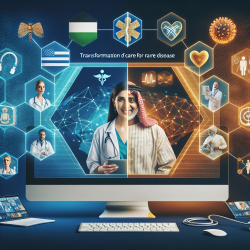Revolutionizing Rare Disease Care with Telehealth
The COVID-19 pandemic has accelerated the adoption of telehealth, reshaping healthcare delivery across the globe. For patients with rare diseases like Batten disease, telehealth offers a lifeline, breaking down barriers to access specialized care. A recent study titled "Utilizing telehealth to create a clinical model of care for patients with Batten disease and other rare diseases" explores the benefits and challenges of integrating telehealth into clinical practice.
Understanding the Benefits of Telehealth
Telehealth provides numerous advantages for patients with rare diseases, who often face significant hurdles in accessing specialized healthcare:
- Convenience: Patients can consult with healthcare providers from the comfort of their homes, reducing the need for travel.
- Cost Savings: By minimizing travel and reducing the need for in-person visits, telehealth can lower healthcare costs.
- Improved Access to Care: Telehealth bridges geographical gaps, allowing patients to access specialists who may be located far away.
- Multidisciplinary Visits: Telehealth facilitates coordination among various specialists, enhancing collaborative care.
Challenges in Implementing Telehealth
Despite its benefits, telehealth presents challenges that healthcare practitioners must address:
- Familiarity with Technology: Both clinicians and patients need training to effectively use telehealth platforms.
- Reimbursement and Coverage: Insurance policies may not fully cover telehealth services, creating financial barriers.
- Security and Privacy: Ensuring the confidentiality of patient information is crucial when using digital platforms.
Building a Multidisciplinary Telehealth Model
For effective telehealth implementation, healthcare systems should consider building a multidisciplinary team that includes neurologists, psychologists, speech therapists, and social workers. This approach ensures comprehensive care tailored to the unique needs of patients with rare diseases.
Telehealth allows these teams to work collaboratively, reducing logistical challenges and enhancing patient outcomes. For instance, speech therapists can assess and monitor language skills remotely, while psychologists provide cognitive assessments and behavioral consultations.
Future Directions and Research
To maximize the potential of telehealth, further research is needed to evaluate its effectiveness compared to traditional in-person care. This research should focus on patient satisfaction, cost-effectiveness, and health outcomes. Additionally, exploring ways to overcome existing barriers and improve telehealth infrastructure will be crucial for its continued success.
Healthcare systems should also consider standardizing telehealth models to ensure consistent and high-quality care for patients with rare diseases.
Conclusion
Telehealth represents a promising avenue for delivering specialized care to patients with rare diseases. By addressing the challenges and leveraging its benefits, healthcare providers can enhance service delivery and improve patient outcomes. As we move forward, continued research and innovation will be key to unlocking the full potential of telehealth in clinical practice.
To read the original research paper, please follow this link: Utilizing telehealth to create a clinical model of care for patients with Batten disease and other rare diseases.










